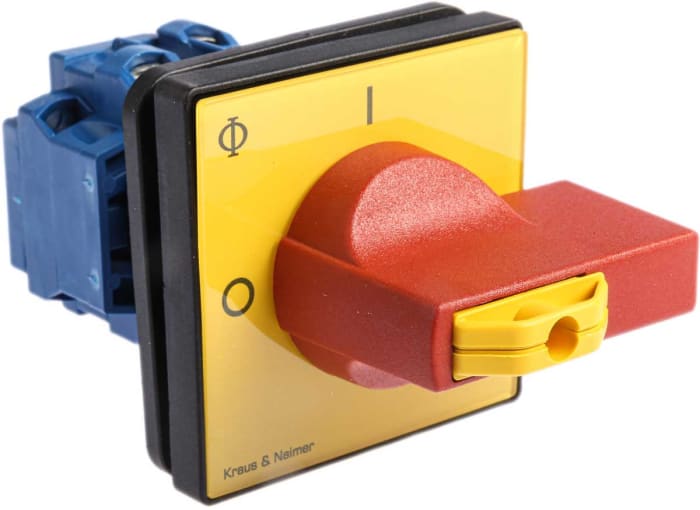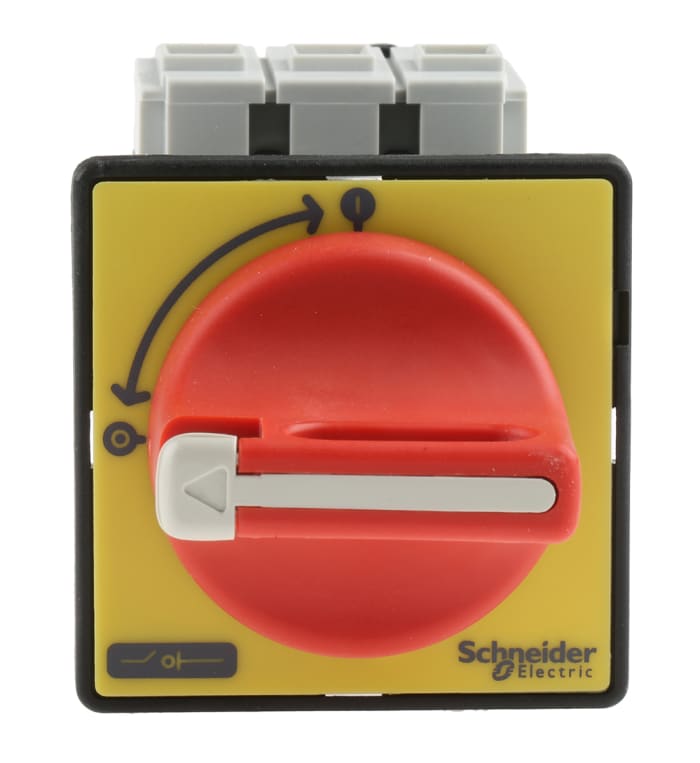Technical Document
Specifications
Brand
Schneider ElectricNumber of Poles
3P
Maximum Current
20A
Mounting Type
Panel Mount
Power Rating
11kW
Voltage Rating
690V ac
Electrical Phase
3
Handle Colour
Black
Accepts Padlocks
Yes
Range
TeSys
Series
VARIO
Switch Rating
8kV
Better World Product (Find out more)
Yes
Better World Verification
Green Premium
Terminal Type
Screw
Minimum Operating Temperature
-20°C
Maximum Operating Temperature
+50°C
Product details
Schneider Electric Isolator Switch - Vario Range
Forming part of Schneider Electrics Vario Switch range is this selection of isolator switches which are sometimes referred to as switch disconnectors. Comprised of a strong and durable material that is suitable for a multitude of environments, these three-pole versions are perfectly suited for manual motor control applications. Super easy to connect and wire as it comes to you undrilled, which enables variable cable entry positions.
switch-disconnectors are compact and robust, they are ideal for hard-wearing industrial environments. This range of isolator switches from Schneider is suitable for use in applications where there is a need to disconnect electrical equipment from the circuit. The need for this form of local isolation is most commonly needed for repair and maintenance of the electrical equipment on the de-energised circuit. These disconnect switches can also be used as safety switches.
Features & Benefits
• Performs local isolation, manual override & safety switch functions
• For use in applications where there is a need to disconnect electrical equipment from the circuit, most commonly needed for repair and maintenance of electrical equipment
• These disconnect switches can also be used as safety switches
• Created and designed to safely isolate a circuit whilst it is being used or maintained
What is the difference between a fused switch disconnector and a non-fused switch disconnector?
Unlike fused switch disconnectors, a non-fuse isolator switch does not use a fuse to break or put a circuit into isolation, they instead use a rotary to disconnect or isolate a circuit.
How does an isolator switch work?
This type of isolator switch can sometimes be referred to as a switch disconnector, this is because it has been created and designed to safely isolate a circuit whilst it is being used or maintained. This isolator switch breaks or isolates a circuit through the rotation of the rotary handle and locking ring. This type of non-fused isolator switch will be found isolating circuit breakers, transmission lines, transformers and a multitude of other applications.
Approvals
UL, CSA, GL

€ 50.07
€ 50.07 Each (ex VAT)
1
€ 50.07
€ 50.07 Each (ex VAT)
1
Stock information temporarily unavailable.
Please check again later.

Technical Document
Specifications
Brand
Schneider ElectricNumber of Poles
3P
Maximum Current
20A
Mounting Type
Panel Mount
Power Rating
11kW
Voltage Rating
690V ac
Electrical Phase
3
Handle Colour
Black
Accepts Padlocks
Yes
Range
TeSys
Series
VARIO
Switch Rating
8kV
Better World Product (Find out more)
Yes
Better World Verification
Green Premium
Terminal Type
Screw
Minimum Operating Temperature
-20°C
Maximum Operating Temperature
+50°C
Product details
Schneider Electric Isolator Switch - Vario Range
Forming part of Schneider Electrics Vario Switch range is this selection of isolator switches which are sometimes referred to as switch disconnectors. Comprised of a strong and durable material that is suitable for a multitude of environments, these three-pole versions are perfectly suited for manual motor control applications. Super easy to connect and wire as it comes to you undrilled, which enables variable cable entry positions.
switch-disconnectors are compact and robust, they are ideal for hard-wearing industrial environments. This range of isolator switches from Schneider is suitable for use in applications where there is a need to disconnect electrical equipment from the circuit. The need for this form of local isolation is most commonly needed for repair and maintenance of the electrical equipment on the de-energised circuit. These disconnect switches can also be used as safety switches.
Features & Benefits
• Performs local isolation, manual override & safety switch functions
• For use in applications where there is a need to disconnect electrical equipment from the circuit, most commonly needed for repair and maintenance of electrical equipment
• These disconnect switches can also be used as safety switches
• Created and designed to safely isolate a circuit whilst it is being used or maintained
What is the difference between a fused switch disconnector and a non-fused switch disconnector?
Unlike fused switch disconnectors, a non-fuse isolator switch does not use a fuse to break or put a circuit into isolation, they instead use a rotary to disconnect or isolate a circuit.
How does an isolator switch work?
This type of isolator switch can sometimes be referred to as a switch disconnector, this is because it has been created and designed to safely isolate a circuit whilst it is being used or maintained. This isolator switch breaks or isolates a circuit through the rotation of the rotary handle and locking ring. This type of non-fused isolator switch will be found isolating circuit breakers, transmission lines, transformers and a multitude of other applications.
Approvals
UL, CSA, GL





